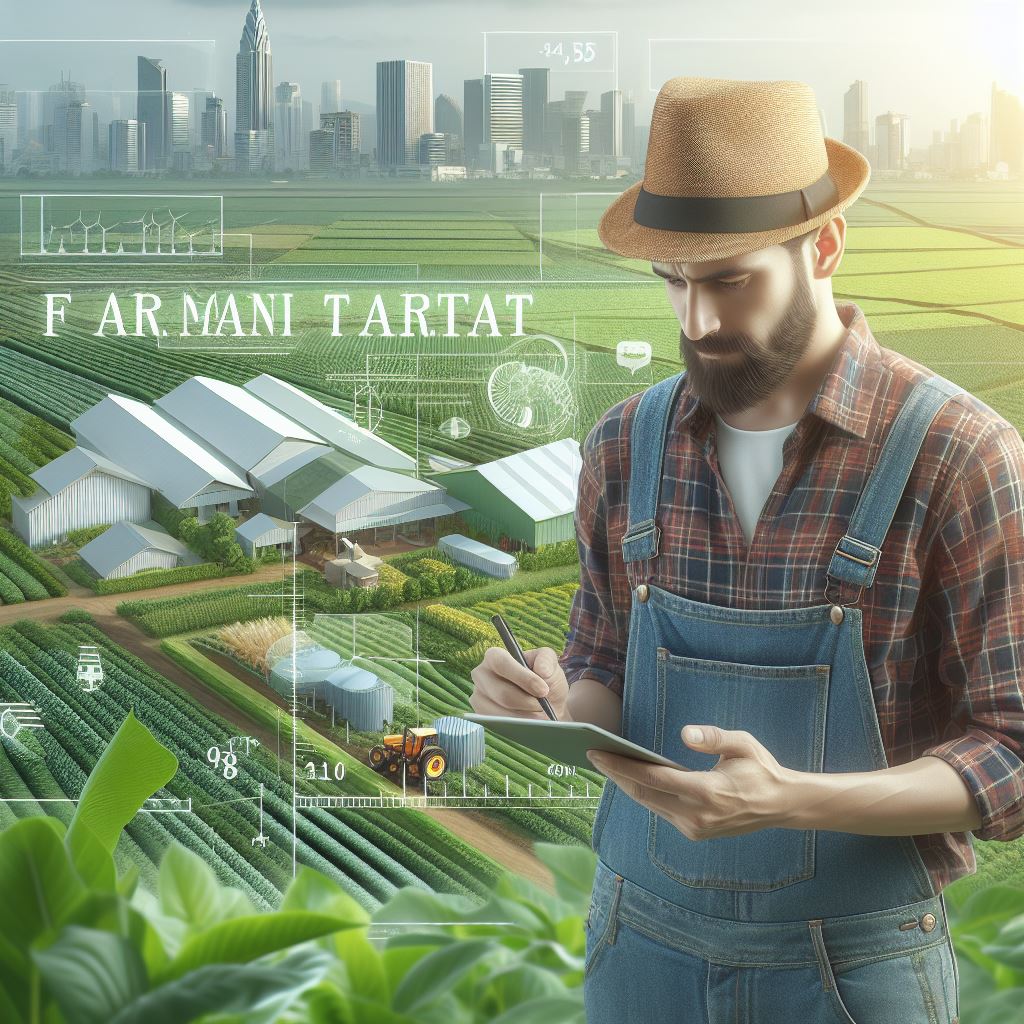Introduction
Let’s Explore Tech Advances vs. Farming Laws
Technology advances play a crucial role in modern farming, revolutionizing the way we produce food.
These advancements have significantly increased productivity, efficiency, and sustainability in agriculture.
However, the adoption of these technologies is often hindered by existing farming laws.
This section explores the importance of tech advances in farming and the impact of farming laws on their adoption.
Importance of Tech Advances in Farming
Technology has revolutionized farming practices, enabling farmers to monitor crops and livestock in real-time, optimize resource utilization, and enhance production.
From precision agriculture techniques to autonomous machinery, tech innovations have transformed farming into a more precise and data-driven industry.
These advances have led to higher yields, reduced environmental impact, and improved profitability for farmers.
Influence of Farming Laws on Tech Adoption
While technology advancements offer numerous benefits to farmers, existing farming laws can pose challenges to their widespread adoption.
Regulatory frameworks often fail to keep pace with technological developments, creating barriers for farmers to fully embrace new methods.
Complex permit procedures, restrictive zoning laws, and limited financial incentives discourage farmers from implementing tech solutions.
Moreover, outdated regulations may not account for the unique risks and requirements of emerging technologies, making their adoption difficult.
Balancing Tech Advancements and Farming Laws
To harness the full potential of technology in farming, it is essential to strike a balance between fostering innovation and ensuring regulatory compliance.
Governments should actively engage with stakeholders to update farming laws, taking into consideration the needs and opportunities presented by tech advances.
This includes streamlining permit processes, providing incentives for adopting innovative solutions, and investing in research and development to address regulatory gaps.
Transform Your Agribusiness
Unlock your farm's potential with expert advice tailored to your needs. Get actionable steps that drive real results.
Get StartedCollaboration between policymakers, farmers, and technology providers is crucial to creating a supportive environment that encourages the adoption of tech advancements in agriculture.
Technology advances have the power to transform the future of farming, but their full potential can only be realized if farming laws evolve alongside them.
By embracing innovation and adapting regulatory frameworks, we can foster a sustainable and efficient agricultural sector that meets the challenges of a growing population while minimizing environmental impact.
It is through this harmonious integration of tech and regulations that we can ensure a bright future for farming.
Overview of tech advances in farming
Technology advances in farming have revolutionized the agricultural industry, providing solutions to various challenges and increasing productivity.
This blog section will delve into the different areas where technology has made significant progress in farming practices.
Precision agriculture
Precision agriculture refers to the use of technology such as GPS to accurately monitor and manage farming activities.
GPS technology allows farmers to precisely track their field boundaries, soil variations, and crop yields.
By having these data, farmers can make informed decisions on applying fertilizers, pesticides, and irrigation, resulting in optimized resource utilization and increased crop yields.
Additionally, drone technology has emerged as a valuable tool for monitoring crops and collecting data.
Drones equipped with high-resolution cameras and sensors can quickly scan large areas of farmland, identifying problem areas such as pests, diseases, or nutrient deficiencies.
This information enables farmers to take prompt action and implement targeted interventions, ultimately improving crop health and productivity.
Automation and robotics
The use of automation and robotics in farming has brought significant advancements in terms of efficiency and cost reduction.
AI-powered machines have revolutionized processes such as planting, harvesting, and sorting crops.
These machines can perform tasks with great precision and speed, minimizing errors and increasing overall productivity.
By automating repetitive tasks, farmers can save time and reduce labor costs, allowing them to focus on other critical aspects of their operations.
Furthermore, robotics has enabled the development of autonomous vehicles that can efficiently navigate farmland, reducing soil compaction and minimizing the environmental impact while carrying out farming activities.
Genetic engineering
Genetic engineering has played a crucial role in improving crop yield and resistance.
Through genetic modification, scientists have been able to enhance crops’ traits such as drought tolerance, disease resistance, and nutrient content.
Genetically modified crops have shown significant potential in addressing food security challenges by increasing agricultural productivity.
However, controversies surround GMOs due to concerns about their safety, potential environmental impact, and ethical implications.
The debate between supporters and opponents continues, highlighting the need for thorough research, regulation, and public discourse on the subject.
Therefore, technology advances in agriculture have revolutionized farming practices in several areas.
Precision agriculture, automation, and robotics, and genetic engineering have all contributed to increased efficiency, productivity, and potential solutions to global food challenges.
Showcase Your Farming Business
Publish your professional farming services profile on our blog for a one-time fee of $200 and reach a dedicated audience of farmers and agribusiness owners.
Publish Your ProfileWhile these advancements bring significant benefits, it is essential to address the concerns and controversies surrounding their implementation to ensure sustainable and responsible farming practices.
Read: Farm Water Rights: A 2024 Overview

Role of Farming Laws
Farming laws play a pivotal role in regulating and governing the intersection between technology advances and agriculture.
These laws cover various aspects such as environmental regulations, food safety, traceability requirements, and intellectual property rights.
In this section, we will explore the specific roles these laws play in shaping the landscape of modern farming.
Environmental regulations
Restrictions on pesticide use and genetically modified crops
Farming laws set restrictions on the use of pesticides and genetically modified (GM) crops.
These regulations aim to protect the environment from harmful chemicals and ensure the safety of both farmers and consumers.
Balancing sustainable farming practices with technology adoption
Farming laws seek to strike a balance between promoting sustainable farming practices and encouraging the adoption of innovative technologies.
They aim to minimize the negative environmental impacts while allowing farmers to leverage technological advancements for increased efficiency and productivity.
Food safety and traceability requirements
Implementing traceability systems for food safety
Farming laws mandate the implementation of traceability systems to ensure food safety.
These systems track the entire supply chain, from farm to table, allowing for quicker identification and resolution of any food safety issues.
Impact on farm operations and adoption of technological solutions
The introduction of food safety and traceability requirements may have an impact on farm operations.
Farmers need to invest in technological solutions, such as tracking software and data management systems, to comply with these laws.
It can enhance transparency and consumer trust in the agricultural sector.
Intellectual property rights and patents
Legal ramifications of genetically modified crops and seed patents
Farming laws address the legal ramifications surrounding genetically modified crops and seed patents.
These laws regulate the ownership and use of genetically engineered seeds and prescribe licensing or royalty agreements, fostering innovation while protecting the rights of both farmers and seed developers.
Balancing innovation and accessibility
Farming laws aim to strike a balance between fostering innovation in agriculture, such as the development of genetically modified crops, and ensuring accessibility for all farmers.
They must protect the rights of seed developers while also enabling small-scale farmers to access affordable technology and seeds.
Most importantly, farming laws have a significant role to play in governing the ever-evolving relationship between technology advances and agriculture.
These laws provide the framework for addressing environmental concerns, ensuring food safety, and protecting intellectual property rights.
By striking a balance between regulation and innovation, farming laws promote sustainable and technologically advanced farming practices that can benefit both farmers and consumers alike.
Read: Crop Insurance Reforms: An Update
Challenges and conflicts
Compatibility issues between technology and regulations
The integration of advanced technologies in the agricultural sector poses several challenges and conflicts.
These issues arise due to the compatibility between technology-driven advancements and existing farming laws and regulations.
A significant challenge is the lack of standardization in data collection and sharing.
With various tech solutions available, there is no uniform format for collecting and sharing data.
This hinders the seamless integration of technology into farming practices.
Implementing tech-driven solutions within legal frameworks also presents difficulties.
The speed of technological advancements often outpaces the development of relevant regulations.
This discrepancy creates a conflict, as farmers may face legal barriers when trying to adopt new technologies.
Information and education gap
Another challenge is the information and education gap among farmers.
Many farmers are not fully aware of or understand the potential benefits and implications of new technologies.
Bridging this gap requires comprehensive education and awareness programs targeted at farmers to familiarize them with the advantages and challenges of adopting technology.
Encouraging dialogue between policymakers, farmers, and tech innovators is crucial for effective integration.
Policymakers need to collaborate with the farming community and technology experts to develop regulations that facilitate the adoption of innovative solutions.
This dialogue ensures that regulations are aligned with the practical needs and aspirations of farmers.
Balancing short-term economic gains with long-term sustainability
Balancing short-term economic gains with sustainable practices is a vital consideration.
While technology advancements may offer immediate economic benefits, there is a need to evaluate their long-term sustainability and potential risks.
Effective policies should be developed to incentivize the adoption of sustainable technologies that contribute to both economic growth and environmental conservation.
Assessing the potential risks and benefits of tech advances is essential for designing appropriate regulations.
Showcase Your Farming Business
Publish your professional farming services profile on our blog for a one-time fee of $200 and reach a dedicated audience of farmers and agribusiness owners.
Publish Your ProfileThis evaluation should involve scientific research, stakeholder consultations, and a comprehensive understanding of the farming landscape.
Only with a thorough assessment can policymakers develop regulations that promote safe and responsible use of technology.
To encourage the widespread adoption of sustainable technologies, policies should incentivize farmers to embrace these innovations.
This can be achieved through financial support, tax incentives, or other economic mechanisms.
By providing tangible benefits, governments can motivate farmers to invest in sustainable technologies and practices, ensuring the long-term viability of the agricultural sector.
In essence, the integration of technology in farming faces various challenges and conflicts related to compatibility with existing regulations, information gaps among farmers, and balancing short-term gains with long-term sustainability.
Addressing these challenges requires standardization in data collection, dialogues between different stakeholders, and the development of policies that incentivize sustainable tech adoption.
Only through concerted efforts can the agricultural sector harness the benefits of technology while ensuring responsible and sustainable farming practices.
Read: Essential Tax Tips for New Farmers
Opportunities for collaboration and solutions
Farmers, tech companies, and policymakers must collaborate to find solutions to the challenges posed by technological advances in agriculture.
Through partnerships and alliances, they can work together to address the complexities surrounding farming laws and make informed decisions.
Partnerships between farmers, tech companies, and policymakers
Sharing knowledge and experiences to shape effective regulations
Farmers, tech companies, and policymakers can come together to exchange information and insights.
By sharing their experiences, they can develop regulations that are practical and beneficial to all parties involved
This collaboration can lead to the creation of laws that address farmers’ concerns while promoting the use of technology in farming.
Encouraging innovation through public-private collaborations
By collaborating with tech companies, farmers and policymakers can foster innovation in agricultural practices.
These collaborations can lead to the development of new technologies and techniques that improve productivity, sustainability, and efficiency on farms.
By actively involving farmers in the process, policymakers can ensure that the technology-driven solutions are practical and relevant to the farming community.
Advocacy and lobbying efforts
Farmers’ role in influencing agricultural policies around technology
Farmers, as primary stakeholders in the agriculture industry, have a significant role to play in shaping agricultural policies.
Through effective advocacy and lobbying efforts, they can express their needs and concerns to policymakers.
By actively participating in the policymaking process, farmers can ensure that farming laws around technology align with their interests and facilitate their adoption of technological advancements.
Engaging with policymakers to create supportive legislation
Farmers can engage with policymakers through direct communication, industry associations, and advocacy groups.
By building relationships with policymakers, farmers can influence the creation of supportive legislation that fosters the use of technology in agriculture.
Through open dialogue and cooperation, policymakers can gain a deeper understanding of the challenges faced by farmers and develop laws that address their needs while encouraging technological progress.
Continuous adaptation and learning
Staying updated on advancements and regulatory changes
It is essential for farmers to stay informed about the latest advancements in agricultural technology and the corresponding regulatory changes.
By staying updated, farmers can assess the potential benefits and risks associated with new technologies, helping them make informed decisions regarding their adoption.
Farmers can also take part in training and educational programs to enhance their understanding of technology and its implications on farming practices.
Identifying opportunities for research and investment in sustainable technologies
Continuous learning involves identifying opportunities for research and investment in sustainable technologies.
By actively seeking out research and investment opportunities, farmers can contribute to the development of innovative solutions that address environmental challenges while increasing agricultural productivity.
The integration of sustainable technologies can lead to more efficient and environmentally friendly farming practices.
In short, collaboration between farmers, tech companies, and policymakers is crucial to addressing the complexities of farming laws in the face of technological advances.
Partnerships, advocacy efforts, continuous adaptation, and learning are key to finding effective solutions that promote the adoption of technology while ensuring the sustainability and productivity of the agriculture industry.
By working together, stakeholders can create a conducive environment for technological advancements in farming while safeguarding the interests of farmers and the environment.
Read: Agriculture Export Laws: Recent Changes
Conclusion
Achieving a balanced approach between tech advances and farming laws is imperative for sustainable agricultural development.
Collaboration and understanding among stakeholders, including farmers, policymakers, and technology developers, are crucial to overcoming challenges and harnessing the full potential of technology in farming.
By fostering open dialogue and embracing innovative solutions, the future holds promising prospects for a harmonious integration of technology and farming regulations.
It is essential to adapt regulations to accommodate technological advancements while ensuring that they align with environmental, social, and ethical standards.
With proactive collaboration and a forward-thinking mindset, the agricultural sector can leverage technology to enhance productivity, efficiency, and sustainability, ultimately benefitting farmers, consumers, and the environment alike.




